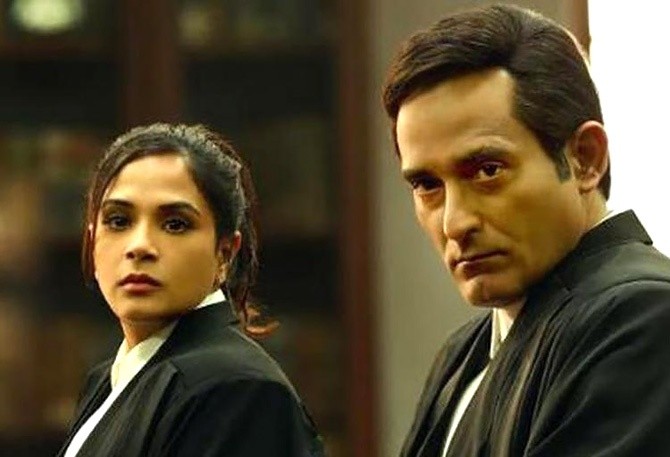Law vs Justice:
Rating: Two stars
It is barely a few months that the #MeToo storm hit India, and the backlash begins– to use the word writer Susan Faludi employed to describe the attacks on feminism.
The men charged with sexual harassment or rape are being quickly rehabilitated, the victims shamed and their testimonies disregarded; women are accused of misusing the laws meant for their protection. Even when a fraction of rape cases are reported, and even fewer convictions happen, when men walk away scotfree while women suffer social and emotional consequences, there will be enough people who will blame the survivor. If the man is rich or powerful, her motives are questioned. A film about the Unnao rape will probably not be made, because it is too horrific, but a case about a film personality accused of rape quickly makes it to the screen in a fictionalized form.
Ajay Bahl’s Section 375 is too smart to plainly stand on the side of the #MenToo or #NotAllMen campaigns, it ties up the viewer in a grey area of will, consent, class, power, media, perception, social media style instant #hangtherapist banshee cries and perception. For a film that has done its homework on the law, it takes shortcuts, like the accused being convicted in an instant sessions court hearing, when even open-and-shut or fast-tracked cases take years.
A junior costume assistant, Anjali Dangle (Meera Chopra), accuses a famous film director Rohan Khurana (Rahul Bhat) of assault and rape. Forensic evidence is in her favour and he is sentenced for ten years. His wife Kainaz (Shriswara) approaches celebrated lawyer Tarun Saluja (Akshaye Khanna) to defend him in high court,. Tarun takes up the case, over his wife’s (Sadhya Mridul) protests, because, as he explains, everyone is entitled to legal defence and money-making cases like this support the pro bono work he does for poor clients. (He happens to live in a bungalow with a swimming pool!)
Against him in court, is the idealistic Hiral Gandhi (Richa Chadha), who used to be his protégée, but left because she did not agree with his approach. According to Tarun, law and justice are not the same thing, and he would rather that the law were upheld, even if justice was denied.
As Hiral flaps about ineffectually, before the two judges (excellent performances by Kishore Kadam and Kruttika Desai), Tarun decimates the arresting officer, and picks holes in Anjali’s testimony.
The film does establish that going to the cops is not easy for a woman who has been raped—the cops and doctors ask humiliating questions; she has to relive the trauma over and over again in court. But Bahl’s sympathy lies with Bhat, who claims to be innocent, and is shot looking scared or shattered.
Tarun comes up with an alternative scenario, without providing any proof, as screaming protesters gather outside court and one of them flings black ink in his face. Akshaye Khanna’s performance is assured and honest, even when he is portrayed as wily, and, perhaps unscrupulous. Richa Chadha, oddly over made-up and unsteady, loses the acting battle in a role that gave her so much scope.
The way Bahl and his co-writer Manish Gupta have structured the film, layers of ‘truth’ –as opposed to ‘facts’– are peeled off slowly, which makes for an engaging and suspenseful courtroom drama, but its gender politics remain suspect.

